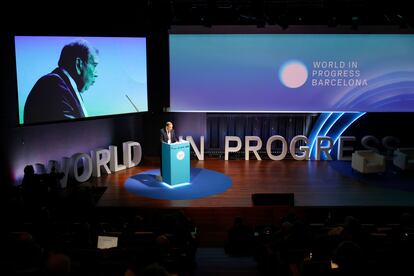Edmundo González Urrutia calls for ‘democratic pressure’ to promote a negotiated solution in Venezuela
‘Due to planetary interaction, the existence of an autocracy in one country constitutes a problem for all the others,’ the opposition presidential candidate warned


Edmundo González Urrutia, the opposition presidential candidate considered by the international community to have won the July election in Venezuela, took advantage of his speech at the World in Progress Barcelona forum on Monday to ask the rest of the world to put “democratic pressure” on the regime of Nicolás Maduro — who also claims to have won the election — and thus force a “peaceful and orderly transition” in the country. He was followed on the podium by former Colombian president Juan Manuel Santos, who expressed his regret that the foreign agenda of the United States ignores the humanitarian crisis in Venezuela, and raised his doubts over certain open avenues of mediation.
“I ask for the active solidarity of the world’s democracies. International support is essential. Our cause is just and democratic,” said González Urrutia, who has been living in Spain since September. The opposition leader, who replaced María Corina Machado as the presidential candidate after the courts blocked her from running, took advantage of the interest generated by his participation at the forum organized by Grupo Prisa in Barcelona to remind people that he has evidence to prove his victory: a high percentage of the electoral records obtained at the polling stations. The Venezuelan electoral authority refused to publish this data, but nevertheless declared Maduro the winner.
By law, the official inauguration of the new Venezuelan president will take place on January 10, 2025. Therefore, the clock is ticking for the various attempts at mediation to find a negotiated solution to the electoral fiasco. González Urrutia has chosen to appeal to the international community in order to maintain a certain momentum. “Due to planetary interaction, the existence of an autocracy in one country constitutes a problem for all the others,” he warned.
“Autocratic consolidation in Venezuela is not just a problem for us. The consequences are already being felt in full force both inside and outside our territory,” he lamented, after recalling how children born in Venezuela are smaller than those in neighboring countries, or that a state pension amounts to just $3.
Without international pressure, the opposition leader insisted, Maduro will not be forced to open a dialogue “essential for all parties” that establishes that the electoral mandate must be “observed with all necessary guarantees.” “That has been our political proposal and line of action, which has not been echoed by the regime and has only unleashed a brutal repressive escalation,” he said.
Following González’s speech, which received a standing ovation, former Colombian president Juan Manuel Santos took to the podium. “[The Venezuelan leader] asked us for solidarity, and I think he deserves it and needs it. If democracies are worried about the rise of autocracy, we should react more vehemently,” said the 2016 Nobel Peace Prize winner.
Santos regretted that the situation in Venezuela “does not exist for American foreign policy” and believes that the lack of interest shown by successive U.S. presidents towards the issue “has been a very counterproductive signal” for action from multilateral bodies.
The former president also attacked his current successor in Colombia, Gustavo Petro. “His position has been ambivalent in mediating, but there is a moment when that becomes complicity,” he denounced. “Colombia should, for its own interests, be much more decisive and strong in its position on Venezuela.” According to data from the government in Bogotá, 2.8 million Venezuelans have emigrated to Colombia.
Sign up for our weekly newsletter to get more English-language news coverage from EL PAÍS USA Edition
Tu suscripción se está usando en otro dispositivo
¿Quieres añadir otro usuario a tu suscripción?
Si continúas leyendo en este dispositivo, no se podrá leer en el otro.
FlechaTu suscripción se está usando en otro dispositivo y solo puedes acceder a EL PAÍS desde un dispositivo a la vez.
Si quieres compartir tu cuenta, cambia tu suscripción a la modalidad Premium, así podrás añadir otro usuario. Cada uno accederá con su propia cuenta de email, lo que os permitirá personalizar vuestra experiencia en EL PAÍS.
¿Tienes una suscripción de empresa? Accede aquí para contratar más cuentas.
En el caso de no saber quién está usando tu cuenta, te recomendamos cambiar tu contraseña aquí.
Si decides continuar compartiendo tu cuenta, este mensaje se mostrará en tu dispositivo y en el de la otra persona que está usando tu cuenta de forma indefinida, afectando a tu experiencia de lectura. Puedes consultar aquí los términos y condiciones de la suscripción digital.








































